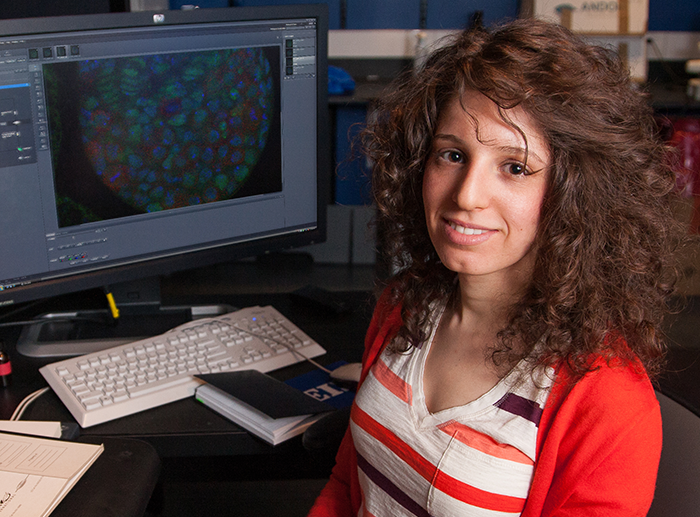We’re taking time over the following weeks to get to know the members of the GSA’s Early Career Scientist Committees. Join us every week to learn more about our early career scientist advocates.
![]()
Didem Sarikaya
Co-chair, Career Development Subcommittee
University of California, Davis
Research Interest:
I’m interested in understanding how genetic differences that exist between populations of animals affect cellular function and ultimately, an individual animal’s health and survival. Increased access to DNA sequencing has led to a boom in population genetic studies that identify single nucleotide polymorphisms (SNPs) between populations, yet how these mutations affect the gene’s function is still poorly understood.
I study these types of population-level genetic variants in fruit flies to better understand how genes that are extremely important for the development of an animal are changing throughout evolution to manifest in phenotypic differences. In particular, I’m focused on studying genetic changes in genes that regulate Erk and Akt, two kinases that transduce signaling pathways that regulate growth, metabolism, and longevity.
As a PhD-trained scientist, you have many career options. What career paths interest you the most?
I am most interested in positions that will allow me to take part in creating positive environments that advance knowledge, both in research and in creating communities that meet the needs of their members. From my experience, the best research environments respect the needs of the members—especially students—and create spaces where people feel respected and free to pursue their interests both at work and in their personal life.
In particular, I am working towards creating these types of environments as an academic researcher by balancing conducting exciting research with building student/academic communities that are well-rounded. Graduate training can be a time of great personal growth, but it can also have moments of struggle and loneliness. I believe that happy people make for a happy work environment, which enhances the creativity of everyone involved. Creating these types of environments is a high priority for my career.
In addition to your research, how else do you want to advance the scientific enterprise?
My childhood was split among Canada, Turkey, Japan, and the US, and I spent most of my life feeling foreign, to some degree, in any setting. Feeling like you don’t belong can be a strong deterrent to being able to put forth your best, and you can find yourself spending energy trying to say the right things or act in the “correct” way.
I still vividly remember the process of learning to speak and present the right way within the scientific community, and I feel strongly about pushing forward programs and dialogues to improve diversity and inclusivity in academic environments. I recently organized sessions around diversity and inclusivity as part of Women in Life Sciences at UC Davis (WiLD) in the fall of 2016, inviting a specialist in academic programs for diversity and an economist who focuses on how people make hiring decisions. The two speakers had very different backgrounds, which led to a very lively discussion because we were able to learn about techniques, successes, and failures from different angles. Being part of facilitating these discussions is something I would like to continue to do as part of advancing the scientific community.
As a leader within the Genetics Society of America, what do you hope to accomplish?
I have been a GSA member since the beginning of graduate school, and I thought it would be exciting to continue bringing together perspectives from different fields in a larger platform. As part of the Career Development Subcommittee, I will be helping launch an interview series featuring people at various stages of their careers—from undergraduates to people holding senior positions in academia and industry. I am particularly interested in hearing about the common struggles that exist across all stages and about how to build skills to overcome these challenges. It has been surprising to me to realize how similar our struggles with things like time management and communication skills continue to be as we move further into our careers. Learning about the experiences of people from various backgrounds can help us better understand the source of the struggles and perhaps identify new techniques.
Another goal of mine is to highlight the shifting priorities and responsibilities of different career paths. Graduate programs provide a variety of skills that are valuable for many different fields, and it can be difficult to narrow on a specific path at times. I think learning about how different scientists have made decisions as their career path developed will be a very valuable way for trainees to structure their vision for their own career.
In addition to the interviews, we will be working to deliver infographics/blog posts/handouts that include career development and hiring tips. Behavioural psychology studies indicate that seemingly simple changes to word choice and information display can have profound impacts on how we perceive a candidate. We are planning to gather data to help young scientists craft better documents for their job searches and to help senior scientists gain better skills in hiring.
Previous Leadership Experience:
- Organizer – UC Davis Women in Life Sciences Group
- Organizer – Harvard University Graduate Student Canadian Club
- Graduate Student Representative – Harvard University GSAS Graduate Student Association
Twitter: @biodids































